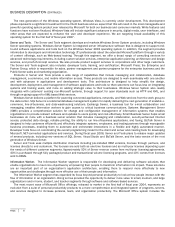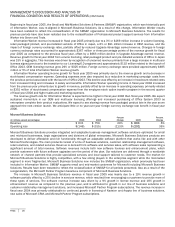Microsoft 2005 Annual Report Download - page 19
Download and view the complete annual report
Please find page 19 of the 2005 Microsoft annual report below. You can navigate through the pages in the report by either clicking on the pages listed below, or by using the keyword search tool below to find specific information within the annual report.
BUSINESS DESCRIPTION (CONTINUED)
PAGE 18
in new PCs, and required licensing of certain communications protocols. While we believe we currently are in full compliance
with the Decree and Judgment, if we fail to comply with them in the future additional restrictions could be imposed on us that
would adversely affect our business. Moreover, there always remains the risk of new legal action, either by governments or
private claimants including with respect to products that haven’t been scrutinized in the past.
In March 2004, the European Commission determined that we must create new versions of Windows that do not include
certain multimedia technologies, many of which are required for certain Web sites, software applications, and other aspects of
Windows to function properly, and we must provide our competitors with specifications for how to implement certain
communications protocols supported in Windows. Microsoft has appealed both determinations to European courts. As a result
of the Commission decision, we have incurred and will continue to incur duplicative development costs (absent a court decision
to reverse or limit this aspect of the ruling). The availability of these alternative versions of Windows in the market also may
cause confusion that harms our reputation, including among consumers and with third party software and web site developers
who rely on the functionality removed from these alternative versions. The Commission ruling obligates Microsoft to make
available specifications for certain Windows communications protocol technologies on licensing terms that are closely regulated
by the Commission. The availability of these licenses may enable competitors to develop software products that better mimic
the functionality of Microsoft’s own products which could result in a reduction in sales of our products. Unless reversed or
limited on appeal, the ruling of the European Commission may be cited as a precedent in other proceedings that seek to limit
our ability to continue to improve Windows by adding new functionality in response to consumer demand. The ruling also
illustrates a risk that competition authorities in Europe or elsewhere may authorize competitors to distribute implementations of
Microsoft communications protocols in source code form without proper contractual provisions to protect our intellectual
property.
We believe our integrated approach to delivery of product innovation benefits consumers and business. Current or future
government regulatory efforts may hinder our ability to provide these benefits reducing the attractiveness of our products and
the revenues that come from them.
Our online services are subject to government regulation of the Internet domestically and internationally in areas such as
user privacy, data protection, and online content. The application of these laws and regulations to our business is often unclear
and sometimes may conflict. Compliance with these regulations may involve significant costs or require changes in business
practices that result in reduced revenue. Noncompliance could result in penalties being imposed on us or orders that we cease
conducting the noncompliant activity.
Our business depends largely on our ability to attract and retain talented employees. Our business is based on successfully
attracting and retaining talented employees. The market for highly skilled workers in our industry is extremely competitive. We
are limited in our ability to recruit internationally by restrictive domestic immigration laws. If we are less successful in our
recruiting efforts, or if we are unable to retain key employees, our ability to develop and deliver successful products and services
may be adversely affected.
Delays in product development schedules may adversely affect our revenues. The development of software products is a
complex and time-consuming process. New products and enhancements to existing products can require long development and
testing periods. Significant delays in new product releases or significant problems in creating new products, particularly any
delays in the Windows Vista operating system, could adversely affect our revenue.
We make significant investments in new products and services that may not be profitable. We have made and will continue to
make significant investments in research, development, and marketing for new products, services, and technologies, including
Windows Vista, Office 12, MSN Search, SQL Server, Windows Server and Xbox 360. Investments in new technology are
inherently speculative. Commercial success depends on many factors including innovativeness, developer support, and
effective distribution and marketing. Significant revenue from new product and service investments may not be achieved for a
number of years, if at all. Moreover, new products and services may not be profitable, and even if they are profitable, operating
margins for new products and businesses may not be as high as the margins we have experienced historically.
Declines in demand for software could occur. If overall market demand for PCs, servers, and other computing devices declines
significantly, or consumer or corporate spending for such products declines, our revenue will be adversely affected. In addition,
our revenue would be unfavorably impacted if customers reduce their purchases of new software products or upgrades to
existing products because new product offerings are not perceived as providing significant new functionality or other value to
prospective purchasers. We are making significant investments in the next release of the Windows operating system (Windows
Vista) and the next release of the Microsoft Office System (Office 12). If these products are not perceived as offering significant
new functionality or value to prospective purchasers, our revenue and operating margins could be adversely affected.
























